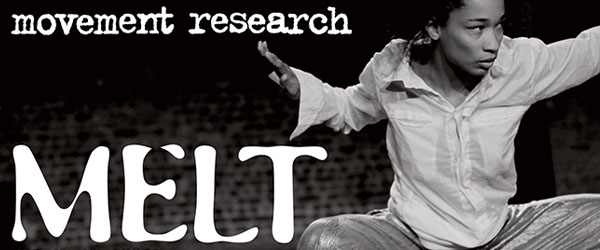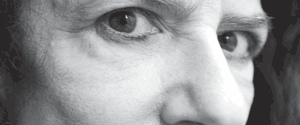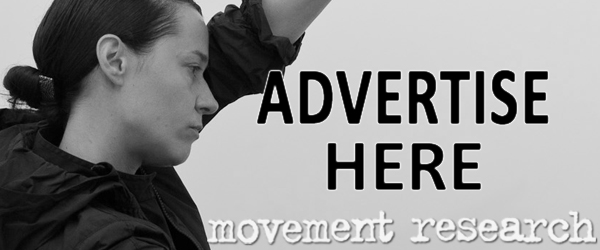Critical Correspondence
- Aaron Mattocks, choreography, music and dance, People Get Ready, pleasure, Steven Reker
- 1 comment
- Conversations
- 10.10.12
Steven Reker in conversation with Aaron Mattocks
Interview date: September 20, 2012
Download a PDF of this conversation
Steven Reker is a Brooklyn-based musician, choreographer and performer, and the primary songwriter and director of People Get Ready. Specific Ocean, a multi-sensory performance mix tape, will be given its world premiere at New York Live Arts on October 18-20, 2012. Steven spoke with Aaron Mattocks, CC Co-editor and a performer in the work, about the path of his career, his use of mix tape as choreographic structure, and the nature of pleasure in art making.
Aaron: Can you talk about why, given the success of the band and the band model, you’ve got such a passion for movement and staying involved with a dance-making practice?
Steven: I’m just doing things the way I know how to do them. All throughout college I danced and made things, and I played in bands on the side. When I got to New York all I did, mainly, was dance, and I tried to have bands, but it never really worked timing wise, because they both take so much responsibility. I finally decided I had to figure out a way to make both work together and for each other. Before I got into it I wasn’t really sure what we were going to do. It was just me and Luke Fasano. We started to find a lot of possibility, stuff that we didn’t even realize we could do because of the format–a band as a dance company or a dance company as a band. It’s offering up a lot of very fun stuff. We’re still working with this idea of a performance mixtape, which is basically a way for me to take all my interests in dance and kind of distill them into little moments. It’s good, but I’m also starting to get that itch, I want to go deeper. Having the residency on Governor’s Island has been great because we can make this piece, within this time frame, but I would love to just take one or two elements and explode them. Next time. Next piece. I don’t know if I answered your question at all.
Aaron: The questions are actually irrelevant. What’s the story behind your first piece, your first Kitchen show?
Steven: Me and Yasuko [Yokoshi] had known each other for a while, and she asked me to be part of the Dance and Process show she curated. It was me, Neal Beasley and Renee Archibald. We had a really awesome time. I was getting home from a year long tour with David Byrne, where I was just full-on dancing. I played guitar on a few songs, and got to sing back up here and there, which helped keep things fresh. Doing the same movements over and over again, it’s pretty rough. That’s when I started developing all this stuff, on the tour bus, or in the hotel, or wherever. I started writing my own record to keep myself sane, having my own project, my own identity within this larger thing. So I got asked to do Dance and Process, and I was kind of feeling burnt out on dance, to be honest. I didn’t know what my future would be in it, I didn’t want to work for anybody anymore. I hadn’t been choreographing at all, but I thought maybe I could give it a shot, to see if I could make these two things I was doing come together. So I had this performance mixtape idea and this 20 minute piece. Remarkably, Deb Singer invited me back to make a full-length, which was shocking. It was a big surprise. The fact that she gave me that opportunity made me work so hard. At one point I was like, oh my god, what the fuck am I doing? I can’t do a full length show. I don’t know how to fucking make work.
Aaron: But you clearly did, instinctively. I would love for you to talk more about the concept of the mixtape as a structure for a show.
Steven: Well, it’s a structure that you can apply to a lot of things. Because if you’re making a mixtape, it’s not the first ten songs you just happen to have in your head. You have to do some research with yourself, your own personal history, you have to look at where this mixtape is going, who it’s going to, and so it sets up all these wonderful parameters. If you’re going to make a sandwich the same way you make a mixtape, odds are that sandwich is going to be delightful, because you have to pull all these ideas together. It’s basically a way to make something that’s slightly precious or personal, that’s also kind of universal.
Aaron: It’s also about giving. It’s made to be gifted.
Steven: I’ve only given a few in my life, to be honest. But every time it’s happened it’s been a pretty special experience. The process of making it has been really so engaging. The packaging, all that stuff. I used to have these mixtape parties, I had them in Arizona, at the record store I used to work at, Stinkweeds, and I also started it here, at a place called Sound Mix. They had a bar in the back and once a month I would have a mixtape party. So you’d come in with your mixtape, based on a theme that I provided, and when your number was called you’d go up and exchange your tape with someone you didn’t know. Even though it’s random, it still shapes how you make your tape, because you want to feel good about what you’ve done. You want your mixtape to be killer, by your own standards at least.
Aaron: It also ties into the concept of pleasure we were talking about in rehearsal. Making a mixtape, the times that I’ve done it, has been either for love or for fun. So there’s pleasure in that.
Steven: Yeah, a lot of pleasure. I think the piece orients itself around that idea–making decisions based on what feels good, for the pleasure of it, instead of trying to be forward thinking, or smart, or cutting edge. I know it’s specific to what I find pleasurable, but I think there is an intelligence in it–it demands awareness. What do you actually enjoy? What’s giving you satisfaction? You have to work for it, to put yourself through the ringer a little bit to get there, which can also in a way be a pleasurable thing. I feel like I’m doing that right now. I’m letting myself be really unhappy, at certain moments. I’m just hanging out there with it.
Aaron: Do you feel like the processes of dance making and songwriting are in any way compatible, have they informed each other, or do you think they’re separate acts of creation?
Steven: I think they both have their turn in my head. I think this piece is sometimes an attempt to find a way for those decisions to happen simultaneously, a total union. The idea of both being seen as one medium which has elements of movement and sound. That’s part of the larger idea of creating sonic landscapes through movement. That union is definitely clear to me. The microphone dance that Luke and I did at The Kitchen, that was a big eye opener. It was so satisfying, so fun, and so dangerous. After that, we realized we had to keep going. I still feel like there’s so many ways we haven’t even thought about. Take the most simple, basic idea…let’s swing some microphones around…but then blow that up, and go deeper. I still think we could make an entire night of microphone dances, and I would be engaged in that as an audience member. I feel like we could really figure out some fun stuff.





4:41 pm
October 10, 2012
Thanks, you two! A great interview that was insightful to the piece and a pleasure to dive into. Can’t wait to witness the mixtape in action.
post a comment ›